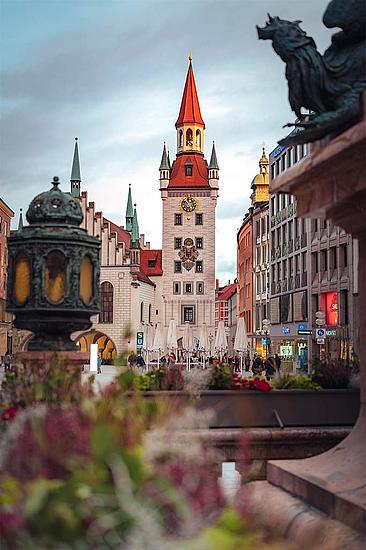This Website uses cookies to improve your visit on our website. More Info
Study Finder
- MBS QUICK FACTS:
- State recognized since 1999
- February and September
- 12 or more Months
- English
- Book a consultation appointment
Before we compare the programs in detail, let's take a quick look at the individual programs. Both MBA vs Masters programs offer specific focuses, study requirements and orientations.
With the Master IB you will not only deepen your knowledge of economic principles but also tailor your studies to your interests, allowing you to build expertise in different areas and enhance your professional profile. The integrated semester abroad equips you with the skills needed for leadership and managerial roles in international business. If you wish to gain even more global experience, you have the option to add a second semester abroad and earn two specialized master’s degrees within two years.
The MBA at MBS not only teaches you how to respond to the ever-changing challenges of the business world, but also how to tackle them with innovation and flexibility. The practice-oriented curriculum imparts a sound understanding of central business concepts and current economic challenges and offers numerous opportunities for practical application. The program is complemented by CV checks, individual career coaching, interview training and networking events.
The following special features play a role in one or both of the MBA and Master's programs at Munich Business School. They provide insights into the content, structure and special features of the programs and illustrate how these courses promote practical learning, individual options and international experiences in the best way.
 Master International Business
Master International Business
 MBA General Management
MBA General Management
The following is a brief explanation of the concepts mentioned in the program.
Concentrations are advanced topics that you can choose within your study program to specialize in specific areas such as marketing, finance or entrepreneurship. In some programs, you can even choose more than one Concentration.
Elective courses give you the opportunity to choose the modules that match your interests and career goals, allowing you to tailor your studies to your individual needs. In many degree programs, you can choose more than one elective course.
A degree program with an international focus prepares you for the challenges and opportunities of global markets through intercultural content, languages and often international experiences such as semesters abroad.
A semester abroad allows you to study at a partner university in a foreign country, gain international experience and improve your language and intercultural skills.
A Dual Degree enables you to earn two degrees in just one period of study, often by spending an additional semester at a partner university abroad. This broadens both your professional qualifications and your international career opportunities.
A mentoring program connects you with experienced professionals or alumni who are ready to provide valuable advice, career tips, and personal support.
A business project is a real-world project in which you work in teams to analyze real business problems and develop innovative solutions, often in collaboration with a partner company.
This is a career development program that uses coaching, workshops and networking to prepare students for the next step in their careers.
Leadership Week is an intensive week during which leadership skills are developed through seminars, practical projects and coaching.
A week in which students test business strategies and practice entrepreneurial decision-making through realistic simulations.
A specialized module that fosters the development of business ideas, entrepreneurship and innovation management.
This includes individual counseling and training that prepares students for application processes, career planning, and leadership skills.
These are ideal opportunities to get to know companies directly, gain insights into industries and make contacts with potential employers.
Events where students can network with companies, alumni and experts to enhance their career prospects.
This is an additional offer to help students learn or improve their language skills (especially in German) in order to prepare for an international or possible German career.
This is just a rough overview to compare the benefits. In this case, it says nothing about which program is better suited to your needs.
| Master International Business (M.A.) | Master of Business Administration (MBA) | |
|---|---|---|
| Duration | 3 Semesters | 2 Semesters |
| Study program language | English | English |
| Start of studies | Winter & summer semester | Winter & summer semester |
| Location | Munich | Munich |
| Format | Full-time study | Full-time study |
| Numerus Clausus | No Numerus Clausus | No Numerus Clausus |
| Recognition | State-recognized | State-recognized |
| Study requirements | Bachelor's degree in a related subject or a pre-master's program instead, also possible without a bachelor's degree under certain circumstances, proof of English proficiency through a test or a previous degree in English | Degree in any subject, at least two years of relevant professional experience (less is also possible under certain conditions), proof of English proficiency through a test or a previous degree in English |
| Scholarship opportunities? | Yes, up to €4,000 in funding | Yes, up to €4,000 in funding |
| Thesis | Master's thesis in German or English | Master's thesis |
| Special features | Dual degree possible, 2 concentrations & 2 electives, international focus, business project, semester abroad, mentoring program | Flagship Courses, 2 Electives, Expert Business Knowledge Courses, Optional German courses, MBA Career Accelerator Program, Leadership Week, Start-up week, Business Simulation week, Business Projects, Networking Opportunities, Career Coaching & Workshops, Company visits & Company presentations |
Do you want to find out what the difference is between an MBA and a Master?
For more information on this topic, please visit our dedicated page.
Difference between MBA and MasterFor international students and professionals, choosing the right city in Germany is about more than just education—it’s about integration, job opportunities, and a welcoming environment. Each of the following cities offers distinct advantages for internationals, but some stand out more than others in terms of global connectivity, job prospects, and cultural inclusivity. Here’s a closer look at each:

Munich is arguably the best city for international students and professionals in Germany. Known for its multinational companies like BMW, Siemens, and Allianz, Munich offers abundant job opportunities for internationals, especially in fields like engineering, business, and technology. Munich’s cosmopolitan vibe, with a large expat community, makes it easy to feel at home. The city regularly hosts international festivals, cultural events, and has a vibrant English-speaking community, making integration smoother. The main drawback is the high cost of living, particularly in terms of housing and daily expenses. However, the high salaries and strong job market often balance this out, especially for skilled professionals.
Stuttgart is an option for internationals too, especially those interested in engineering, automotive, and technology. As the headquarters of Mercedes-Benz and Porsche, Stuttgart offers job opportunities in high-tech industries and has a strong demand for international talent. The city has an international community and offers some English-speaking jobs, particularly for highly skilled workers. Similar to Munich, Stuttgart can be expensive, particularly regarding housing. Additionally, while many workplaces operate in English, German proficiency is often expected in daily life.
Leipzig has been gaining slowly some popularity among internationals, thanks to its cultural scene and kind of affordable cost of living. While Leipzig doesn’t have the same level of multinational corporations as Munich or Stuttgart, its startup ecosystem is growing, offering some opportunities for internationals looking to enter entrepreneurial or creative fields. Job opportunities for internationals, especially in more traditional sectors, can be limited compared to larger cities. Also, while English is becoming more common, German proficiency is still highly beneficial for finding work.
A university's accreditations are an important indicator of the quality and recognition of its study programs. Institutions such as the Ministry of Education, FIBAA, the German Council of Science and Humanities assess the academic excellence, practical orientation, and international standards of universities. Below, we take a look at the most important accreditations of the Munich Business School.
Munich Business School was the first private university in Bavaria to receive state recognition in 1999. In 2010, the Bavarian State Ministry for Science and the Arts granted unlimited state recognition.
This decision was made by the committee after an extensive procedure, in the course of which the achievements in research and teaching were examined to determine whether they met recognized scientific standards.
The Foundation Accreditation Council (AR) has the legal mandate to regulate the accreditation of study programs in Germany and thus to ensure the quality of studies and teaching.
FIBAA is a European, internationally oriented agency for quality assurance and quality development in higher education. Its quality seal of approval certifies the professional relevancy and quality of the study courses.
The best location for an MBA vs Masters degree program depends on your personal preferences and goals. Your choice should depend on your budget, industries and lifestyle. Here is a rough consideration of three exemplary locations Munich (MBS), Stuttgart and Leipzig for an MBA vs Masters:
| Munich | Stuttgart | Leipzig | |
|---|---|---|---|
| Economy | 10/10 | 7/10 | 5/10 |
| Internationality | 10/10 | 6/10 | 4/10 |
| Networking Opportunities | 9/10 | 7/10 | 3/10 |
| Infrastructure | 9/10 | 7/10 | 6/10 |
| Quality of Life | 10/10 | 8/10 | 6/10 |
| Cost of Living | 2/10 | 3/10 | 7/10 |
| Student Life | 8/10 | 6/10 | 6/10 |
| Nature | 10/10 | 7/10 | 5/10 |
| Recreational Possibilities | 10/10 | 6/10 | 6/10 |
| Culture | 9/10 | 6/10 | 8/10 |
| 87/100 | 63/100 | 56/100 |
Choosing between a Master in International Business and an MBA in General Management from Munich Business School depends largely on your career goals, professional background, and desired industry. While both programs are designed to prepare students for leadership roles in the global business environment, they cater to different audiences and open distinct career pathways. Here’s a comparison of the career opportunities and prospects for graduates of each program:

This program is tailored for recent graduates or individuals with limited work experience who are looking to kick-start an international career. It’s ideal for those who want to develop foundational skills in global business management, international marketing, finance, and supply chain management.
Graduates are well-prepared for international roles in various industries, including consulting, finance, marketing, and supply chain management. The program emphasizes global business practices, making it ideal for roles that require cross-cultural competence and an understanding of international markets. MIB graduates typically start in specialist or analyst roles and can progress to management positions over time. With additional experience or certifications, they may transition into more strategic roles like senior consultant, international project manager.
The MBA is designed for experienced professionals who aim to accelerate their careers into higher management or leadership roles. It focuses on strategic thinking, leadership development, and decision-making at a senior level.
The MBA opens doors to senior management and leadership roles across industries. Graduates often transition into positions that require strategic oversight, team leadership, and organizational development. The program’s focus on general management allows for flexibility across industries and functions, making it highly versatile. The degree provides a solid foundation for C-suite positions or executive leadership within 5-10 years post-graduation. Many also leverage their MBA to start their own businesses or take on consulting roles at prestigious firms.
Alumni experiences are a crucial factor when choosing the right degree program. Ratings on platforms like the german site StudyCheck give you authentic insights into the quality of teaching, support, and career prospects from the perspective of former students. Below, we compare ratings of the master's and MBA programs at Munich Business School to give you a solid basis for your decision.

These ratings come from the German rating portal StudyCHECK.de. The ratings are current as of February 4, 2025.
★★★★☆ 4,2
98% would recommend
★★★★☆ 4,5
100% would recommend
★★★★☆ 4,5
100% would recommend
Munich consistently ranks as one of the best cities for students, thanks to its world-class universities and a vibrant cultural scene. The city boasts a rich mix of history and modernity, offering everything from museums and theaters to lively beer gardens and the iconic Oktoberfest. The proximity to the Alps makes it perfect for outdoor enthusiasts who enjoy skiing or hiking.
However, the high cost of living—especially rent—can be a challenge, making budgeting crucial for students. That said, the excellent public transport, abundant part-time job opportunities, and high quality of life more than compensate for this.
Stuttgart is a suitable choice for students interested in engineering and technology, given its status as the headquarters for companies like Mercedes-Benz and Porsche. The city offers a nice standard of living and some career prospects for internships and post-graduate jobs.
However, similar to Munich, Stuttgart can be expensive, especially when it comes to housing. The city is also more business-focused, so those looking for a more Bohemian or artsy scene might find it a bit conservative. Plus, it is not as near to the Alps or other nice nature spots in Bavaria, than Munich is.
Leipzig offers a vibrant arts scene and an affordable cost of living. The city is famous for its creative community, lively nightlife, and alternative culture. Students enjoy the laid-back vibe, along with access to green spaces and cultural events.
Challenges include fewer job opportunities compared to larger cities like Munich or Stuttgart, and while the city is growing, it may lack some of the infrastructure or global connections of more established cities.
The choice between an MBA and a Master's depends on individual career goals and interests. An MBA is more appropriate if you want to pursue a leadership position in the business world or be entrepreneurial. A master's is better suited if you want to focus on a specific field or academic career. It is important to consider your goals and the requirements of your intended career to make the right decision.
An Executive MBA (EMBA) is a specialized MBA degree designed for experienced professionals and managers. It is designed to provide working professionals with the opportunity to improve their management skills and leadership abilities without having to give up their professional commitments. The EMBA often includes challenging courses and emphasizes the application of business strategies to the real world. This degree allows executives to advance their professional development without interrupting their careers.
The value of a master's or MBA degree depends on your career goals and the industry you want to work in. Both degrees have their own value. A master's is valuable if you want specialized expertise and an academic career, while an MBA is valuable if you want a leadership position in business or management. Ultimately, the value depends on how well the degree fits your individual goals.
An MBA title stands for "Master of Business Administration". It is a postgraduate academic degree designed to develop managers and professionals in the business world. The title is awarded upon completion of an MBA program and attests to successful completion of a comprehensive management and business administration program.
A Master of Business Administration (MBA) offers a wide range of benefits, including:
The exact benefits depend on individual goals and career situation. However, an MBA can be a valuable investment in professional development.


